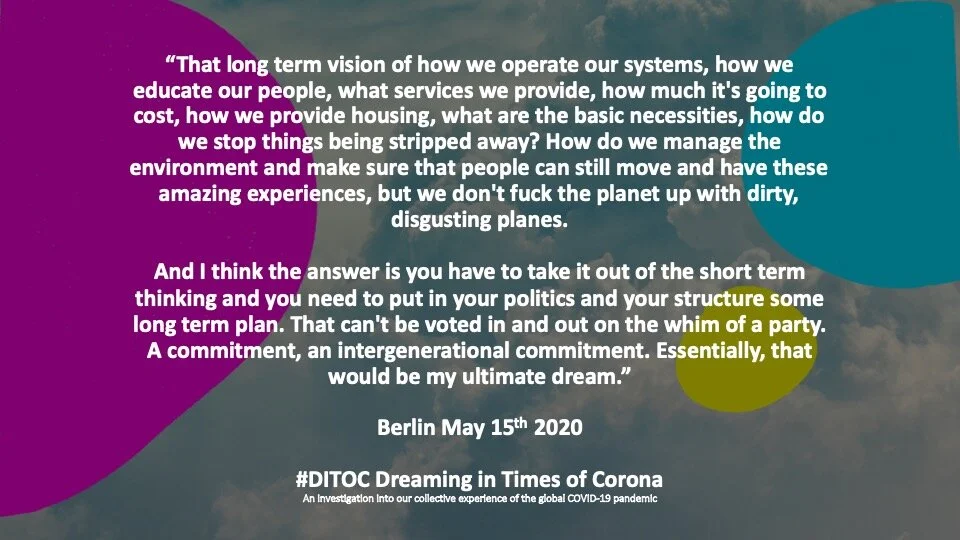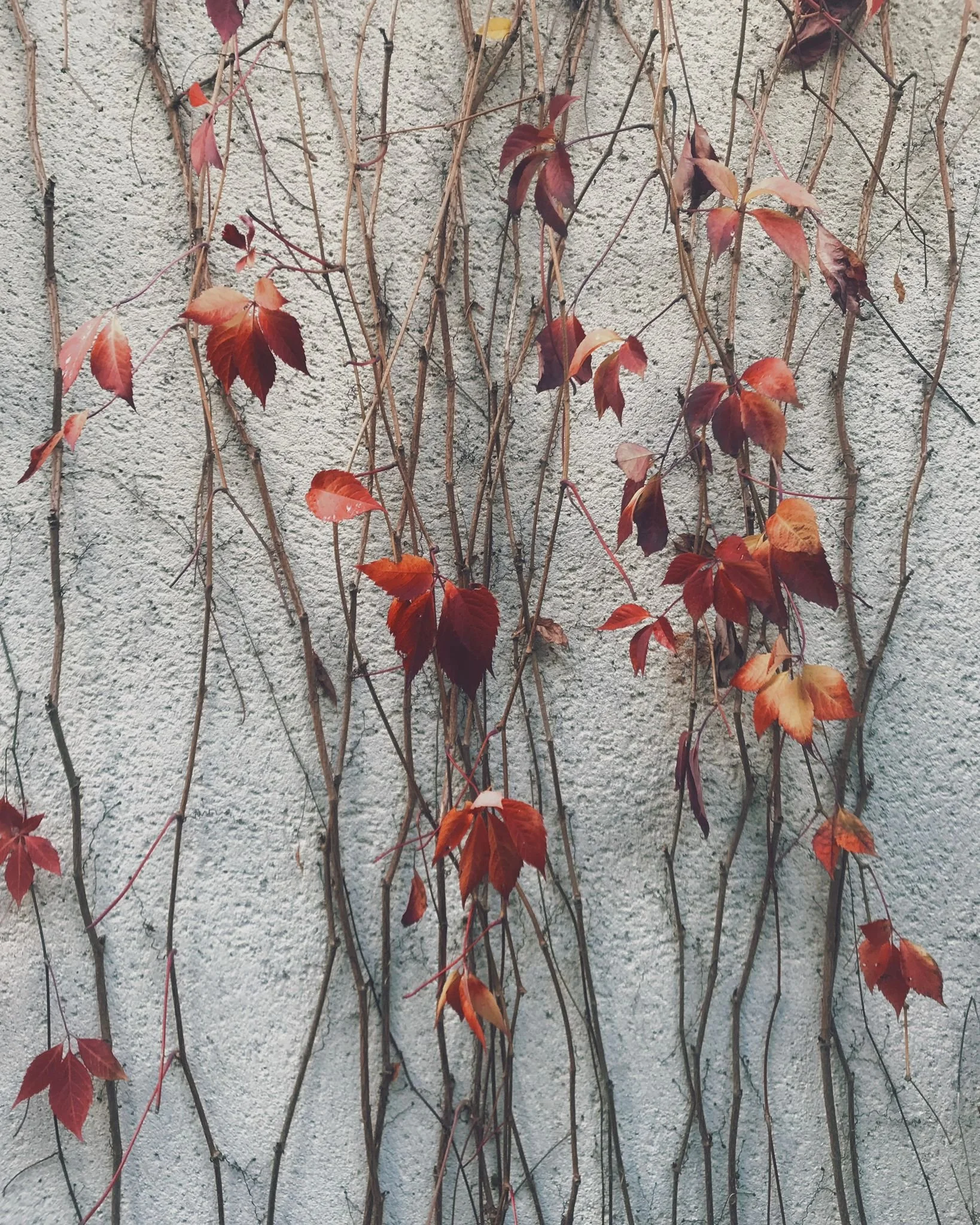So, it's May 15th. We are somewhere in the Corona pandemic. How do you experience the situation at the moment?
A mixed bag. So personally, I'm in Berlin with my young family, two children, four year old, one year old, and my German husband and I can't go home.
And at home is my mom, who has got diabetes and she's in a renal clinic. She's at the point where she's got renal failure, so her kidneys have failed and she has dialysis three times a week in a clinic. A small clinic. And she told us that five of the 15 people in the beds on her slot have died. That's five out of fifteen. So she's nervous and worried and she's alone and nobody can see her. But she has to go to have her dialysis her every week. There's three occasions a week where she could be infected.
This is quite scary. And there's nothing you can do about it. I'm used to if my mom needed anything, like from cutting the grass or going to buy some food or whatever, I'll just go there. And now we live abroad. We've been away a couple of years. I can't help her. So that's frustrating.
And then the other way that I look at it, like on a kind of more socio-political broader scale. And it's nice to see politicians taking it seriously, putting the economy at risk. Some arguing too much. Others it was not enough, it was too late for the UK or it's gonna cost us so much, there's other damage. I mean, it's just it's a complicated mess politically. But it's nice for me to see that globally we can take something on within days, you know, information get spread and that can be joined up working. And we can listen to scientists and we can share reports and make decisions.
Thank you. So when you look back at this two and a half month in Germany at least. Is there anything in this time that you observed or that you learned about yourself or the city you live in or society you're living in?
Yes. So in the last two and half months. I had no child care, so my son has been out of Kindergarten. And parents are stressed. And what we did in our neighbourhood, we formed artificial families. So when the pandemic hit, there was a lady in a WhatsApp group in the street where we live. And she got families together and said, okay, we just getting to one group of three families and we don't mix. And then you share the hours and the load. And that's been really good. And that is the kind of community vibe and living I have always dreamed of. And I've got it. And that makes me really happy because I think, you know, what more do you want than neighbours working together, helping each other, knowing that it's a strain on everybody? And and finding a solution.
Legally, it's an illegal solution. But because you couldn't you weren't allowed to mix. But we were two weeks free. And then we formed these sort of artificial family clusters and we've stayed in them for two and a half months – strictly. And now it's a little bit different because some of those parents have now been able to go back to Kita. I've learned that my family not system relevant. My husband is not system relevant. We're not going anywhere until August.
And just having my kids at home, like I've got one year old who hasn't got a Kita-spot anyway. But anyway, and it was really nice to have him around his brother and around his sibling and our adopted covid sibling. It is so nice. And he's done really well. So it's super positive.
And then there's been like the darker bits where you are seeing that it back home and in places like America people are dying exponentially. Poorer people, people who are living in crowded living spaces, people without gardens. And all the kind of secondary problems. People scared to go to hospital, missing appointments that they need and then having other deaths that are not Covid, but they're kind of like heart disease or whatever strokes. But don't want to go into a doctor.
And then racially, this hits people who are on the front lines. So they're more likely to be black, ethnic minority people who are stuck with dealing with this pandemic and not having the right services and support in place. Now, they don't have a country home to go to. They can't drive out to their seaside cottage. You know, they're just stuck. And the cities can be, they are breeding grounds because we live so close together. And that's the beauty of somewhere like London or New York. And right now, it's, unfortunately for some people, a horror movie. Yeah, it's sad. And dealing with that as well and thinking, what can you do? What can we do better?
Thanks. So we looked a little bit at the experience of the moment, we looked back at the last two and a half month. So I invite you to look a bit ahead, maybe to a time where we learn to live well with the virus. What do you want more of or less of?
I would love to live in a world where if there was a vaccine that would be free to use. There's no like patent being bought by the Trump administration. Been sold off to like countries. And then people in small towns or on minimum wage would never get that money together to get a vaccine. That would be a nightmare. I'd like to see and some learning from it. Actually, we often can do this in quicker time than before. We can actually look back while we're in it. So we are already seeing the disproportionality of people hit from poorer backgrounds or from ethnic minorities. So with this kind of information, how can we move forward next time? What kind of safety do we need to put in place? How can we make people safer? I mean, I don't know if you follow UK politics, but there's like a big argument around the fact that there's not enough safety equipment for the staff.
You know, they haven't got the right amount of masks and safety and protective gear. And that is just ludicrous for a country so advanced as the U.K. and places like America where you would assume that they've got the sort of world class services.
So in Germany, I mean, the death rate compared to the cases that have been active, is phenomenal. It's low. It's four times lower than the UK. I think you've now got nine thousand dead. Now, the UK is second highest just under the United States. Like 33000 or something. I mean, it's not fair on the public, not fair on the people, and they pay for an NHS service that's being cut every year since the Conservative Party had been in power. And they're paying for it with their lives. I mean, they always have been, but now they really are. Like it's obvious.
I'm somebody that studies social policy. I did a Masters at the LSE, and this is something that I really feel strongly about. I think everything is a policy. Everything is policy. And possible. When everything is policy, then it's possible.
It just takes some thinking and some money and some enthusiasm and the right political party, perhaps. And I mean, even the Tories could do it. You never know.
Yes, I think we need some solutions so that we keep people safe. And also that they can thrive. I mean, think of all of the secondary case of shutting down stuff, you know, is left left so many people exposed. What the artists doing. Or the theaters a. All of the places where we go as a as a group, as big groups. People, festivals, all of these things, these expos where like brains get together and sparks happen. All of that is gone at the moment.
And I would hate for that not to ever come back. Because, I mean, some people have real life changing experiences in crowded places and travelling. There's something beautiful about having a passport and being able to go in a few hours, you go and have some food in France. You can take the train to anywhere you like. Really, or a plane. I mean, come on to that in the future with the cost to the environment.
I mean, that's that's the thing with this thing. It's so complicated because on the one hand, all these people can't meet. But then look what's happening in nature. You know, you can see the Himalayas in India. The sea turtles are in Thailand because nobody's on the beaches. It's almost like we've given the planet a bit of a rest from our overuse of it.
And now we're reaping some of those rewards. Well, nature is and that's nice as well. So it's always very complicated and complex, but it's not impossible to find good solutions. So I hope we do some good learning from this. I hope that we can move forward and it will be looked back on in a positive way.
Sometimes they also say a crisis is a chance. Maybe you already mentioned a little bit of it. I think it's not easy in that situation. But I want to invite you to somehow ignore the gravity of the given. So, when you think of the future, what is your wildest dream about the future? What don't you even dare to dream sometimes?
I would love a world without racism. That is my one, if I could have one wish, that would be it, because it causes so many problems and it is so irrelevant what color somebody is or where they're from. And I think that that would be the first thing I'd love. No racism. That we just we could do it. I mean, if you can tell people to stay in their homes and not move for two weeks. And that can be a clear message. I think we could do better in how we tell people how to live their lives in respect to things like "you cannot be racist". And this is why. And also. Just be nice to people.
I do a lot of support and activism for the Intergenerational Foundation. if.co.uk is their website and they basically look at the chances, the life chances of young people and the future generations, those are not born yet. And how we can in our short term politics that we all have because every politician has a term to serve. How can we get over that, leap over that partisan line and think about the future and what we're leaving for our future children? And I've got little children now, and I joined it the IF crew before I was a mum. And now I've got children and I think they one day will have children. That long term future. You know, that long term vision of how we operate our systems, how we educate our people, what services we provide, how much it's going to cost, how we provide housing, what are the basic necessities, how do we stop things being stripped away? How do we manage the environment and make sure that people can still move and love people and have these amazing experiences, but we don't fuck the planet up with dirty, disgusting planes.
Like, how do you do that? You know, how do you try and solve those complex issues? And I think the answer is you have to take it out of the short term thinking and you need to put in your politics and your structure some long term plan. That can't be voted in and out on the whim of a party. A commitment, an intergenerational commitment. Essentially, that would be my ultimate dream.
Thank you very much.







